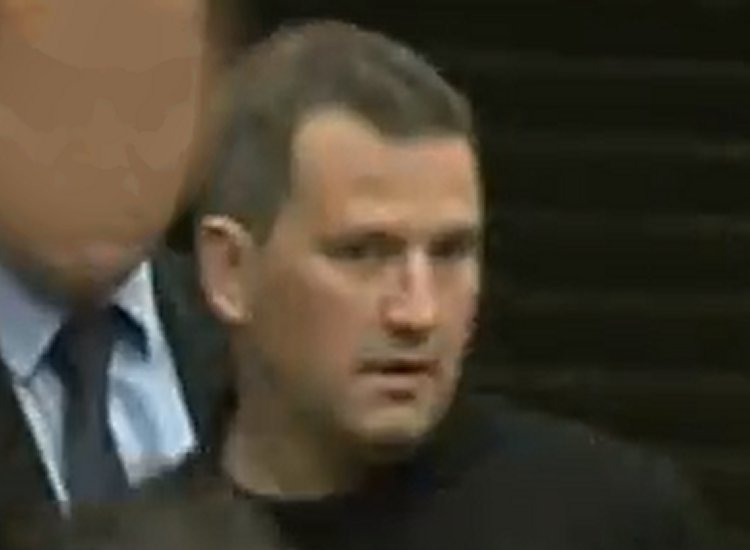
Killer Graham Dwyer had to speak to his legal team today after he repeatedly stopped his appeal hearing and denied texting his victim Elaine O’Hara saying he would love to stab a girl to death sometime” and that “blood turns me on”, reports The Mirror.
Dwyer, 50, who was convicted of killing the vulnerable social worker for her sexual gratification in 2012, is appealing his sentence. His lawyers argue that the withholding of data from the cell phones used in the case is an “opportunistic form of mass surveillance” that turns phones into tracking devices that can reveal a detailed picture of every aspect of a person’s life.
At the Court of Appeal today, Dwyer repeatedly interrupted Sean Guerin SC, for the DPP, to deny the text messages attributed to him.
Mr. Guerin was drawing the court’s attention to a June 27, 2011 text message sent from a phone attributed to Dwyer that read: “I want to stick my knife in flesh while sexually aroused. Blood turns me on and I would love to stab a girl to death sometime,” reports The Mirror.
Mr. Guerin said that Dwyer did to Ms. O’Hara what he said he would do.
“I didn’t say any of that,” interrupted Dwyer from the prisoner’s area.
“I never wrote that,” Dwyer interrupted again. On another occasion he interrupted Mr. Guerin by simply saying “no” when the lawyer was talking about text messages.
Court of Appeal President George Birmingham addressed Mr Farrell about the interruptions from his client and said: “Mr Farrell, we have ignored one interruption…”. Dwyer’s legal team later spoke with him about his behavior.
Mr Guerin said there was “overwhelming” evidence in the case that Dwyer was the user of the phone, but that he had not relied on the use of disputed call data to secure a guilty verdict at trial.
The barrister said Dwyer was identified at trial through three different routes. “One was call-data. At the same time, there is an old-fashioned detective job in Blackrock garda station which involved reading the text messages and identifying personal information which would point towards the identity of the suspect,” he said, reports The Mirror.
He added that there were also scientific analyzes involving DNA and genetic materials that also turned up the same suspect.
Mr. Guerin said that there were four elements in the DPP case at trial that had not changed.
Mr. Guerin said a text from Ms. O’Hara on the phone attributed to Dwyer read: “you’re now a daddy again.” At trial, the boy’s birth certificate matched the date on the text, which the DPP said showed it was Dwyer who was using the phone.
The lawyer said that on April 4, 2011, the phone attributed to Dwyer wrote that he had a committee meeting at the Shankill Flying Club and a witness gave testimony and produced minutes proving that Dwyer was present…
On another date, the phone attributed to Dwyer complained in a text of an invoice for almost 4,000 euros to repair his car, which was confirmed by the documents provided to the court.
Similar accounts of buying a new bicycle, emailing a tattoo parlor, entering a model airplane contest, getting a pay cut, and receiving a reception at the Polish embassy have been confirmed by witnesses or documents in the trial, Guerin said.
Mr. Guerin asked if there could be “any other person in the world” with a child born on the same day Dwyer’s child was born, who also bought a bicycle the same day Dwyer did and whose car bill, salary reduction, flying competition Entering and attending a reception at the Polish Embassy matched the dates of the texts referring to it.
Remy Farrell SC, for Dwyer, held in the three-judge Court of Appeals that the cell phone data should not have been admitted as evidence in his client’s trial because the retention of that data was a violation of his rights under the European Charter of Fundamental Rights. Farrell said the Court of Justice of the European Union (CJEU) has said “over and over” that the retention of mobile phone data cannot be done and that Irish courts now have to “internalise” what the court said. european court.
Dwyer, a Cork-born architect with an address in Dublin’s Foxrock, was convicted by a jury at the Central Criminal Court in 2015 of the murder of 36-year-old Elaine O’Hara on August 22, 2012. His victim had been discharged from a psychiatric hospital hours earlier. Dwyer fantasized about stabbing a woman during sex and used Mrs. O’Hara to fulfill her fantasy. After killing her, he disposed of some of her belongings in Vartry Reservoir in Wicklow and tried to make it appear she had committed suicide. He dumped her body in a forest where it was found in 2013.
The appeal continues this afternoon in Central Criminal Court before Justice Birmingham, Justice Isobel Kennedy and Justice John Edwards.
Tell us your thoughts in the Facebook post and share this with your friends.



